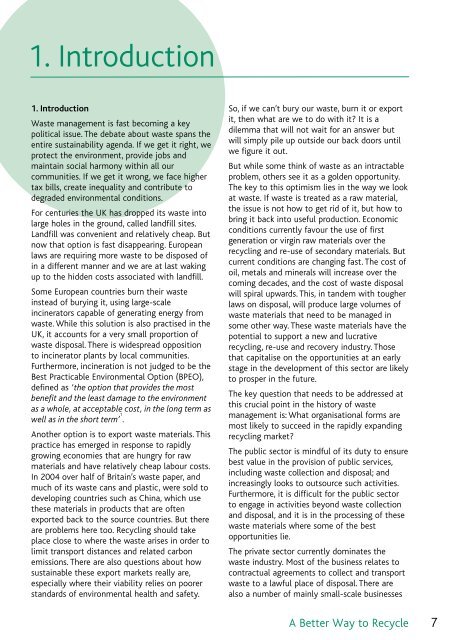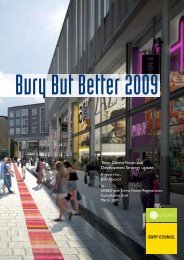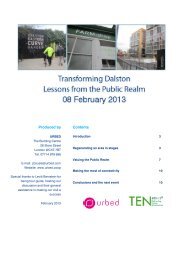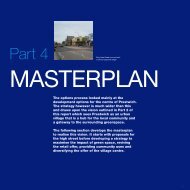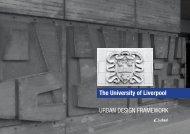A Better Way to Recycle: co-operative and community ... - Urbed
A Better Way to Recycle: co-operative and community ... - Urbed
A Better Way to Recycle: co-operative and community ... - Urbed
You also want an ePaper? Increase the reach of your titles
YUMPU automatically turns print PDFs into web optimized ePapers that Google loves.
1. Introduction1. IntroductionWaste management is fast be<strong>co</strong>ming a keypolitical issue. The debate about waste spans theentire sustainability agenda. If we get it right, weprotect the environment, provide jobs <strong>and</strong>maintain social harmony within all our<strong>co</strong>mmunities. If we get it wrong, we face highertax bills, create inequality <strong>and</strong> <strong>co</strong>ntribute <strong>to</strong>degraded environmental <strong>co</strong>nditions.For centuries the UK has dropped its waste in<strong>to</strong>large holes in the ground, called l<strong>and</strong>fill sites.L<strong>and</strong>fill was <strong>co</strong>nvenient <strong>and</strong> relatively cheap. Butnow that option is fast disappearing. Europeanlaws are requiring more waste <strong>to</strong> be disposed ofin a different manner <strong>and</strong> we are at last wakingup <strong>to</strong> the hidden <strong>co</strong>sts associated with l<strong>and</strong>fill.Some European <strong>co</strong>untries burn their wasteinstead of burying it, using large-scaleincinera<strong>to</strong>rs capable of generating energy fromwaste. While this solution is also practised in theUK, it ac<strong>co</strong>unts for a very small proportion ofwaste disposal. There is widespread opposition<strong>to</strong> incinera<strong>to</strong>r plants by local <strong>co</strong>mmunities.Furthermore, incineration is not judged <strong>to</strong> be theBest Practicable Environmental Option (BPEO),defined as ‘the option that provides the mostbenefit <strong>and</strong> the least damage <strong>to</strong> the environmentas a whole, at acceptable <strong>co</strong>st, in the long term aswell as in the short term’ 1 .Another option is <strong>to</strong> export waste materials. Thispractice has emerged in response <strong>to</strong> rapidlygrowing e<strong>co</strong>nomies that are hungry for rawmaterials <strong>and</strong> have relatively cheap labour <strong>co</strong>sts.In 2004 over half of Britain’s waste paper, <strong>and</strong>much of its waste cans <strong>and</strong> plastic, were sold <strong>to</strong>developing <strong>co</strong>untries such as China, which usethese materials in products that are oftenexported back <strong>to</strong> the source <strong>co</strong>untries. But thereare problems here <strong>to</strong>o. Recycling should takeplace close <strong>to</strong> where the waste arises in order <strong>to</strong>limit transport distances <strong>and</strong> related carbonemissions. There are also questions about howsustainable these export markets really are,especially where their viability relies on poorerst<strong>and</strong>ards of environmental health <strong>and</strong> safety.So, if we can’t bury our waste, burn it or exportit, then what are we <strong>to</strong> do with it? It is adilemma that will not wait for an answer butwill simply pile up outside our back doors untilwe figure it out.But while some think of waste as an intractableproblem, others see it as a golden opportunity.The key <strong>to</strong> this optimism lies in the way we lookat waste. If waste is treated as a raw material,the issue is not how <strong>to</strong> get rid of it, but how <strong>to</strong>bring it back in<strong>to</strong> useful production. E<strong>co</strong>nomic<strong>co</strong>nditions currently favour the use of firstgeneration or virgin raw materials over therecycling <strong>and</strong> re-use of se<strong>co</strong>ndary materials. Butcurrent <strong>co</strong>nditions are changing fast. The <strong>co</strong>st ofoil, metals <strong>and</strong> minerals will increase over the<strong>co</strong>ming decades, <strong>and</strong> the <strong>co</strong>st of waste disposalwill spiral upwards. This, in t<strong>and</strong>em with <strong>to</strong>ugherlaws on disposal, will produce large volumes ofwaste materials that need <strong>to</strong> be managed insome other way. These waste materials have thepotential <strong>to</strong> support a new <strong>and</strong> lucrativerecycling, re-use <strong>and</strong> re<strong>co</strong>very industry. Thosethat capitalise on the opportunities at an earlystage in the development of this sec<strong>to</strong>r are likely<strong>to</strong> prosper in the future.The key question that needs <strong>to</strong> be addressed atthis crucial point in the his<strong>to</strong>ry of wastemanagement is: What organisational forms aremost likely <strong>to</strong> succeed in the rapidly exp<strong>and</strong>ingrecycling market?The public sec<strong>to</strong>r is mindful of its duty <strong>to</strong> ensurebest value in the provision of public services,including waste <strong>co</strong>llection <strong>and</strong> disposal; <strong>and</strong>increasingly looks <strong>to</strong> outsource such activities.Furthermore, it is difficult for the public sec<strong>to</strong>r<strong>to</strong> engage in activities beyond waste <strong>co</strong>llection<strong>and</strong> disposal, <strong>and</strong> it is in the processing of thesewaste materials where some of the bes<strong>to</strong>pportunities lie.The private sec<strong>to</strong>r currently dominates thewaste industry. Most of the business relates <strong>to</strong><strong>co</strong>ntractual agreements <strong>to</strong> <strong>co</strong>llect <strong>and</strong> transportwaste <strong>to</strong> a lawful place of disposal. There arealso a number of mainly small-scale businessesA <strong>Better</strong> <strong>Way</strong> <strong>to</strong> <strong>Recycle</strong> 7


